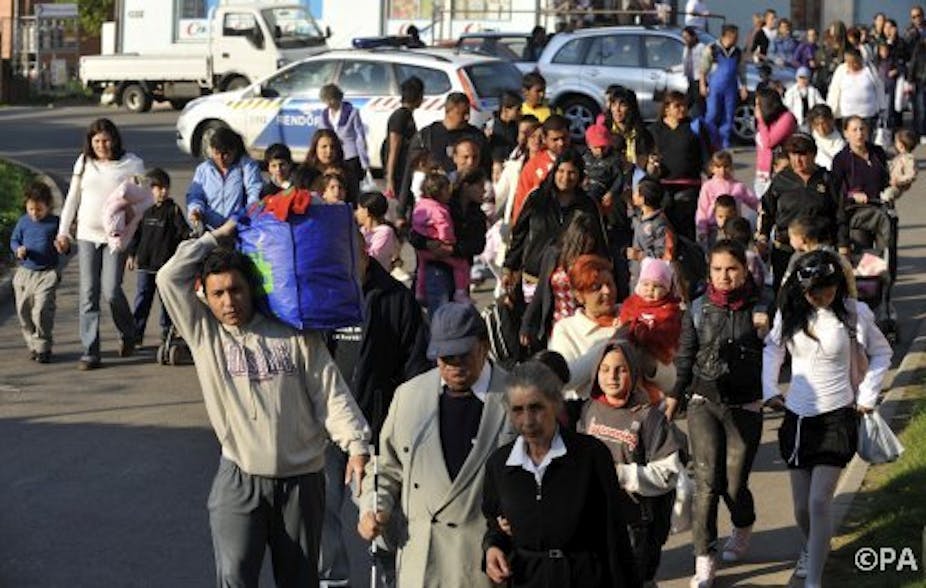Since the accession of Central European countries to the European Union (EU), threats to their Roma communities have escalated dangerously. This is evident in anti-Roma rallies, random violent attacks against families and neighbourhoods, and discriminatory public statements and government policies in many EU countries, including the Czech Republic, Romania, Bulgaria, France and Italy. Hungary, however, has become a particular concern.
In the past six years, sustained hate crimes and racist propaganda have created a threatening atmosphere for Roma families and communities across the country. The mounting incidence of violence against Hungary’s Roma is at the heart of a recent report issued by Harvard University’s FXB Center for Health and Human Rights. It recounts evidence of escalating violence, killings, military trainings, and propaganda against Roma in Hungary from 2008 to the present.
I grew up in Romania and have worked on Roma rights issues in central and eastern Europe for several years. Although I have witnessed inter-ethnic tensions and extremist attacks against Roma, including Roma houses set on fire and Roma families expelled into the woods for weeks, the incidents I tracked on a recent field trip to Hungary still managed to shock me. In Hungary, anti-Roma sentiment is not limited to the blatant rejection and discrimination against the Roma community that currently abounds across Europe; it also includes systemic threats, physical attacks, and killings.
No end in sight
The FXB report alerts institutions, opinion-makers and the general population to the escalating violence and hatred targeted against the Roma. The report documents threatening behaviour by organisations, and the perpetration of crimes that have induced widespread terror amongst Hungary’s Roma population.
Far-right parties and organisations continue to organise marches and rallies across Hungarian cities and villages. The amplification of these extremist voices has not only reinforced existing anti-Roma sentiments, but also provoked anti-Roma violence. Racially motivated crimes, which are not always treated as such, are now a common occurrence throughout the country. The European Roma Rights Center tracked 61 incidents of such violence between 2008 and 2012, and recorded the murders of seven adults and two children. In June 2008, for example, Human Rights First reported that a man killed a 14-year-old Romani boy in Fenyeslitke and threatened to “kill all the Roma in the village”.
Though the rise in racially motivated crimes and violent attacks since 2008 should have been strong signals for intervention, the FXB report shows how weak Hungarian government’s response has been. Because of its failure to act definitively, perpetrators and their followers have been emboldened, untrammeled by public outrage or strong government sanction. Racist violence is increasingly accepted as a legitimate form of retribution, a model followed by citizens, organisations, and leaders alike.
Just as troubling as this escalating violence is the proliferation of secret camps run by neo-Nazi groups to prepare their members for armed combat. One of these groups, the Hungarian National Front, was found to be organising military trainings on weapon usage, combat, and urban fighting once a month in 2012-2013. According to an informant interviewed by the Athena Institute, training involves “physical exercises, running, basic formation exercises, which are roughly the same as a basic military training for conscripts”. He added: “tactical shooting, in-building and assault tactics were practised with air and paintball guns”.
The Wiesenthal Center, amongst others, urged the Council of Europe in 2009 to investigate the neo-Nazi revival, warning: “Hungary is sinking into the abyss of racial hatred that could easily spread throughout this region.”
But so far, no organisation or individual in Hungary has been found guilty of clandestine combat preparation, even though organising military training in weapon usage, combat, and urban fighting is illegal in the EU.
Old lessons
The FXB report notes that over the past year, violent attacks, marches, and racially motivated crimes against Roma have declined, and this is certainly a positive development. However, the fact that right-wing extremist policies and laws are simultaneously being put into place is deeply worrying. Instilling fear can take many forms.
In Hungary, violent attacks, killings and rallies of the past five years have now given way to extremist right-wing policies, which generate the same lack of safety for Roma and for other minority groups. The tendency to replace actual violence with repressive legislation has been seen in other countries affected by mass violence and conflict, such as Kosovo and Bosnia-Herzegovina.
The renewal of anti-Roma activity demands we hold the EU and its member states responsibile for protecting the Roma community, as they are compelled to do. Societies across the continent are riven by economic, political, and ethnic tensions. Hungary, along with other European countries, has experienced a serious economic decline over the past few years. In such precarious times, the EU’s stated obligation to defend democracy and protect the safety of all its citizens becomes even more pressing.
The EU was founded on lessons learned from the lethal excesses of extremist ideology, and by failing to address the insecurity of the Roma in Hungary, the it fails in its obligation to preserve human dignity, respect for human rights, equality and freedom. It is a shame and an outrage that the Roma community must rely on advocates and human rights groups rather than governments. The increasingly frightening case of Hungary shows how urgently Europe’s Roma need new allies and guardians.

